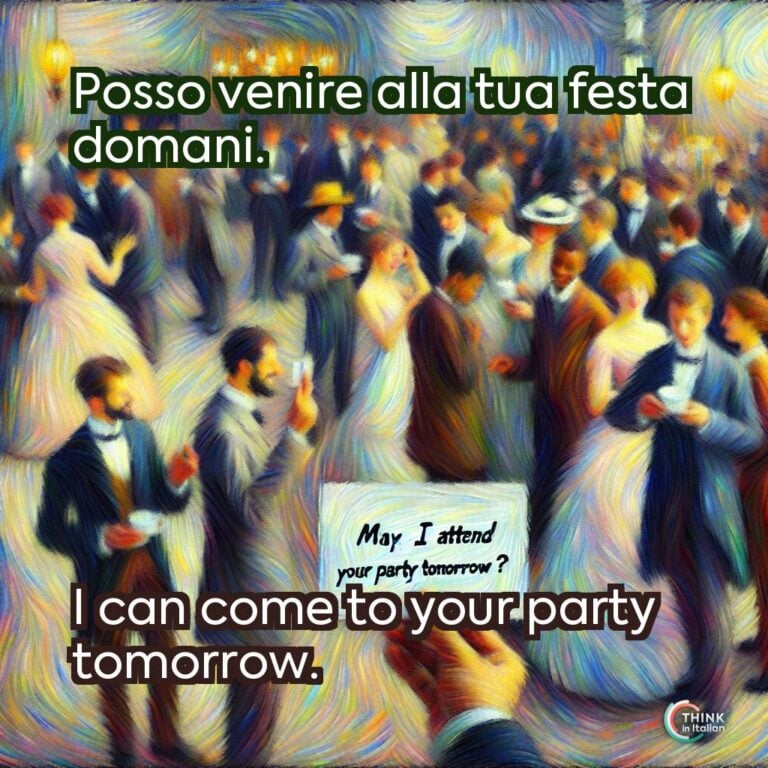What are Modal Verbs?
In linguistics, modal verbs are a special category of auxiliary verbs that are used to specify the way an action is performed. They express abilities, possibilities, permissions, obligations, and knowledge.
Unlike other verbs, modals cannot stand alone, but they must be linked to another verb – the main verb – that expresses the meaning of the action itself. In Italian, the main verb is always conjugated in the present infinitive.
Italian modal verbs are potere (can), volere (want), dovere (must), and sapere (know how to, be able to). Being able to use them and conjugating them in different tenses is essential for fluent communication.
There are multiple articles on this topic, because Italian modal verbs are irregular, therefore it is important that you properly learn how to conjugate them.
Italian Modal Verbs
“Potere” – the Verb of Possibility
Potere can be translated in English as “to can” or “to be allowed to”, depending on the context. For example, if you want to ask someone if you can borrow their book, you can say:
Posso prendere in prestito il tuo libro?
Can I borrow your book?
When discussing your capabilities or possibility, you might say:
Posso cucinare io se non ti va.
I can cook if you do not want to.
As you can see, potere is always followed by an infinitive verb.
“Volere” – Expressing What you Want
When it comes to expressing desires, you can use volere, meaning “to want”. If you’re in a restaurant and want to order pizza, you can say:
Vorrei una pizza margherita.
I would like a pizza margherita.
If you’re telling a friend about your weekend plans, you might say:
Volevo visitare il museo, ma era chiuso.
I wanted to visit the museum, but it was closed.
As you can see, I conjugated the verb in other tenses, to show you that modal verbs can be used with different purposes.
“Dovere” – the Verb of Obligation
Dovere means “to have to” or “to must”, and is therefore used to express necessity or obligation. If you have to study for an exam, you can say:
Devo studiare per l’esame.
I must study for the exam.
Or if you want to give advice or make recommendations, you can say:
Dovresti riposare.
You should rest.
“Sapere” – Knowing how to do Something
Sapere has a unique use and translation among Italian modal verbs because it’s about knowing how to do something, not just knowing facts. It’s used when you want to express that you have the knowledge or skill to do something.
For example, if you’re talking about a skill like playing the piano, you can say:
So suonare il pianoforte.
I know how to play the piano.
Or if you’re discussing whether someone knows how to cook a particular dish, you might say:
Sai cucinare la carbonara?
Do you know how to cook carbonara?
Combining Modal Verbs
Although modal verbs are auxiliary verbs, they can be combined. This results in both behaving as auxiliary verbs and another verb behaving as the main verb, as in the following examples:
Devo saper sciare bene per andare in vacanza.
I must know how to ski properly to go on holiday.
Voglio potere parlare bene l’italiano.
I want to be able to speak Italian well.
As you can see, there must be an infinitive verb after the modal verb, be it alone or combined.
Conjugating Modal Verbs
Presente
| Potere | Volere | Dovere | Sapere | |
|---|---|---|---|---|
| Io | posso | voglio | devo | so |
| Tu | puoi | vuoi | devi | sai |
| Lui/Lei | può | vuole | deve | sa |
| Noi | possiamo | vogliamo | dobbiamo | sappiamo |
| Voi | potete | volete | dovete | sapete |
| Loro | possono | vogliono | devono | sanno |
Let me give you some examples:
Posso ripetere se non hai capito.
I can repeat if you did not understand.
Voglio bere un caffè.
I want to drink a coffee.
Devi studiare per l’esame.
You must study for the exam.
Sanno cucinare molto bene.
They can cook very well.
Participio Passato
As you know, the past participle is essential to form compound verbs, like passato prossimo or futuro anteriore. Here, you can study the conjugation of the past participle of Italian modal verbs:
| Potere | Volere | Dovere | Sapere | |
|---|---|---|---|---|
| (no subject) | potuto | voluto | dovuto | saputo |
Imperfetto
Here, you can study the conjugation of the imperfect of Italian modal verbs:
| Pronoun | Potere | Volere | Dovere | Sapere |
|---|---|---|---|---|
| Io | potevo | volevo | dovevo | sapevo |
| Tu | potevi | volevi | dovevi | sapevi |
| Lui/Lei | poteva | voleva | doveva | sapeva |
| Noi | potevamo | volevamo | dovevamo | sapevamo |
| Voi | potevate | volevate | dovevate | sapevate |
| Loro | potevano | volevano | dovevano | sapevano |
For example:
Da bambino potevo mangiare senza ingrassare.
When I was a child I could eat without gaining weight.
Mio cugino voleva diventare un medico.
My cousin wanted to become a doctor.
Nel fine settimana dovevamo svegliarci presto ogni giorno.
In the weekend we had to wake up early every day.
Loro sapevano leggere già da piccoli.
They knew how to read already as children.
Passato Prossimo
Here, you can study the conjugation of the present perfect of Italian modal verbs:
| Potere | Volere | Dovere | Sapere | |
|---|---|---|---|---|
| Io | ho potuto | ho voluto | ho dovuto | ho saputo |
| Tu | hai potuto | hai voluto | hai dovuto | hai saputo |
| Lui/Lei | ha potuto | ha voluto | ha dovuto | ha saputo |
| Noi | abbiamo potuto | abbiamo voluto | abbiamo dovuto | abbiamo saputo |
| Voi | avete potuto | avete voluto | avete dovuto | avete saputo |
| Loro | hanno potuto | hanno voluto | hanno dovuto | hanno saputo |
Non ho potuto richiamarti.
I was not able to call you back.
Hai voluto fare il dolce? Ora finiscilo!
Did you want to bake the cake? Now finish it!
Siamo dovuti partire presto stamattina.
We had to leave early this morning.
Lui ha saputo rispondere alle domande.
He could answer the questions.
Futuro Semplice
| Potere | Volere | Dovere | Sapere | |
|---|---|---|---|---|
| Io | potrò | vorrò | dovrò | saprò |
| Tu | potrai | vorrai | dovrai | saprai |
| Lui/Lei | potrà | vorrà | dovrà | saprà |
| Noi | potremo | vorremo | dovremo | sapremo |
| Voi | potrete | vorrete | dovrete | saprete |
| Loro | potranno | vorranno | dovranno | sapranno |
Potrò visitare la Spagna l’anno prossimo.
I will be able to visit Spain next year.
Vorranno vivere in campagna un giorno.
They will want to live in the countryside someday.
Dovrai fare attenzione durante la presentazione.
You will have to pay attention during the presentation.
Sapremo riconoscere l’anello falso.
We will be able to spot the fake ring.






